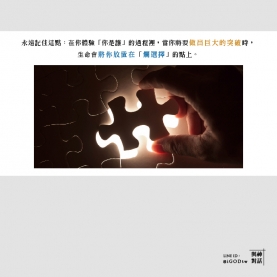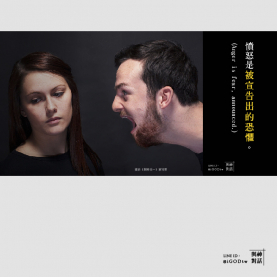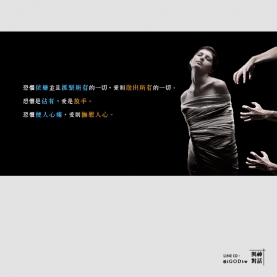許多人犯了這樣的錯誤:經由對別人的愛在尋求對「真正的自己」的愛。當然,他們並沒有了解和意識到他們在這樣做...
他們認為:「我只要能愛別人,他們就會愛我。然後我會是可愛的,而我也會愛我自己。」
這樣的想法於是造成,有非常多的人恨他們自己...

聽神談【正視:人類「親密關係」中最悲慘的誤解】-2/2
大師(Master)明白別人在做什麼、有什麼、說什麼、要求什麼、想什麼、期待什麼、計畫什麼都沒關係。唯一有關係(重要)的是,在你與那些的關係中,你being(是、處於、散發著)什麼(It only matters what you are bing in relationship to that.)。
最具有愛的人是那「以較高自我為中心」的人(The most loving person is the person who is Self-centered.)。
尼爾:這觀念是個激進的教導(radical teaching)……
如果你仔細地觀察,就不會認為這樣。如果你無法愛你「較高的自己」,你便無法愛別人。許多人犯了這樣的錯誤:經由對別人的愛在尋求對「真正的自己」的愛(Many people make the mistake of seeking love of Self through love for another.)。當然,他們並沒有了解和意識到他們在這樣做。這並非一個有意識的努力。這是他們「心智如何在運作」的情況。在心智的深處,在你們所謂的潛意識裡的運作情況。
他們認為:「我只要能愛別人,他們就會愛我。然後我會是可愛的,而我也會愛我自己。」

這樣的想法於是造成,有非常多的人恨他們自己,因為他們覺得沒有人愛他們。這是一種病——一種當人們真的犯了「愛的疾病」(love sick 註:這是名符其實的愛的疾病,神幽默地點出人類大都只把love sick視為「相思病」)的時候,因為真相是,別人的確愛他們,但那並無關緊要。不管多少人公然宣稱對他們的愛,都還不夠。
首先,他們不相信你。他們認為你在試圖操縱他們——試圖想得到什麼東西(你怎麼可能因為他們真正的樣子而愛他們?不,一定有誤。你一定想要某東西!那麼,你到底要什麼?)。
他們終日無所事事,試圖理解怎麼可能有人真的愛他們。由於他們不相信你,乃開始從事一些活動,好讓你去證實。你必須證明你愛他們。而要做到這點,他們可能要你開始改變你的行為。

接下來,如果他們終於得到一個「他們可以相信你愛他們」的結論,他們便立刻開始擔心「他們能保有你的愛多久」。所以,為了要抓住你的愛,他們開始改變他們的行為。
如此一來,兩個人都在關係中喪失了自己。他們進入這關係,本是希望找到他們自己,卻反而喪失了自己(They get into the relationship hoping to find themselves, and they lost themselves instead.)。
這種在關係中對自己「較高自我」的喪失,正是導致大多數這類怨偶之間痛苦的原因。(This losing of the Self in a relationship is what cause most of the bitterness in such couplings.)
兩個人在一種合夥關係中結合,希望整體比兩個個體加在一起之總合來得大,卻發現反而更少。他們覺得比當他們是單身時還要差。能力更差、更不能夠、更不令人興奮、更沒吸引力、更少喜悅、更少甘願和滿意。
這是因為他們都變得更少了(變差了 This is because they are less.)。因為他們都為了處在——為了留在——他們的關係中,已放棄了他們大半的本來面目(they have given up most of who they are)。
關係從來不該是這種模樣。然而,這正是關係是如何被比你們所知道的還更多的人們經驗的模樣。
摘自《與神對話 I》第8章


The Master understands that it doesn't matter what the other is being, doing, having, saying, wanting, demanding. It doesn't matter what the other is thinking, expecting, planning. It only matters what you are being in relationship to that.
The most loving person is the person who is Self-centered.
Neale: That is a radical teaching…
Not if you look at it carefully. If you cannot love your Self, you cannot love another. Many people make the mistake of seeking love of Self through love for another. Of course, they don't realize they are doing this. It is not a conscious effort. It's what's going on in the mind. Deep in the mind. In what you call the subconscious.
They think: "If I can just love others, they will love me. Then I will be lovable, and I can love me."
The reverse of this is that so many people hate themselves because they feel there is not another who loves them. This is a sickness—it's when people are truly "lovesick" because the truth is, other people do love them, but it doesn't matter. No matter how many people profess their love for them, it is not enough.
First, they don't believe you. They think you are trying to manipulate them —trying to get something. (How could you love them for who they truly are? No. There must be some mistake. You must want something! Now what do you want?)
They sit around trying to figure out how anyone could actually love them. So they don't believe you, and embark on a campaign to make you prove it. You have to prove that you love them. To do this, they may ask you to start altering your behavior.
Second, if they finally come to a place where they can believe you love them, they begin at once to worry about how long they can keep your love. So, in order to hold onto your love, they start altering their behavior. Thus, two people literally lose themselves in a relationship.
They get into the relationship hoping to find themselves, and they lose themselves instead.
This losing of the Self in a relationship is what causes most of the bitterness in such couplings.
Two people join together in a partnership hoping that the whole will be greater than the sum of the parts, only to find that it's less. They feel less than when they were single. Less capable, less able, less exciting, less attractive, less joyful, less content.
This is because they are less. They've given up most of who they are in order to be—and to stay—in their relationship.
Relationships were never meant to be this way. Yet this is how they are experienced by more people than you could ever know.










